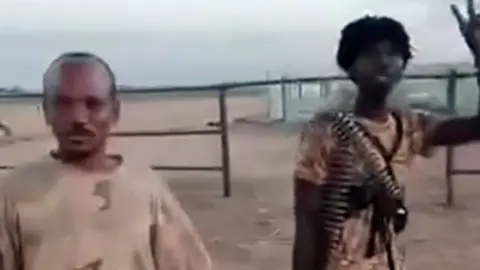RSF storms cattle market and prison in 'death trap' Sudanese city
 RSF
RSFThe Sudanese paramilitary group Rapid Support Forces (RSF) stormed the besieged city of el-Fasher on Friday in a battle that raged for seven hours, witnesses told the BBC.
RSF fighters managed to capture a cattle market, a prison and a military base while broadcasting videos of themselves walking around empty stockyards.
It was the first time RSF fighters had entered the city in large numbers since the siege of el-Fasher - an ongoing battle for control of the western Darfur city - began 15 months ago.
On Saturday morning, the army retaliated and succeeded in pushing the RSF back beyond el-Fasher's limits. But Mathilde Vu, from the Norwegian Refugee Council (NRC), described the city as a "death trap".
"What we're hearing is stories of horror and terror and weekly shelling, attacks on civilian infrastructure," Ms Vu told the BBC Newshour programme.
"There are local volunteers - they are really struggling, risking their lives every day to try and provide a little bit of food for people who are mostly starving."
Siddig Omar, a 65-year-old resident of el-Fasher, told the BBC the RSF entered the city on Friday from the south and south-west.
The RSF, whose fighters have been mustering in trenches dug around the city, frequently attack el-Fasher. According to the army, this was their 220th offensive.
But this time, during a battle that raged for seven hours, they managed to take control of the city's livestock market, which has been closed for business for several months.
From here, they broadcast videos of their fighters walking around empty stockyards. They also briefly held Shalla prison and the headquarters of the military's Central Reserve Forces.
On Saturday morning, the army retaliated and succeeded in pushing the RSF back beyond the city limits, saying it had inflicted "heavy losses" on the paramilitary group.
But Mr Omar said RSF shelling - using drones - continued throughout Saturday.
"One of the shells hit a civilian vehicle near my house resulting in the death of five civilians who were inside the car," he said.
Sudan plunged into a civil war in April 2023 after a vicious struggle for power broke out between its army and the RSF.
It has led to a famine and claims of a genocide in the western Darfur region.
More than 150,000 people have died in the conflict across the country, and about 12 million have fled their homes in what the United Nations has called the world's largest humanitarian crisis.
El-Fasher is the only city in Darfur now controlled by the military. But a communications blackout makes it difficult to confirm information from the besieged city, as only those with satellite internet connections are contactable.
- Sudan war: A simple guide to what is happening
- Sudan in danger of self-destructing as conflict and famine reign
- BBC smuggles in phones to el-Fasher to reveal hunger and fear
The latest RSF offensive followed weeks of artillery and drone attacks. The group recently started using large drone aircraft.
The army accuses the United Arab Emirates (UAE) of funding the RSF, an allegation the oil-rich Gulf state denies.
This weekend's attack comes three months after the RSF overran Zamzam camp on the outskirts of el-Fasher. It had been the largest displacement camp in the country and many of its residents either escaped into el-Fashir or tried to make it to Tawila, 60km (about 40 miles) away.
Ms Vu, NRC's advocacy manager in Sudan, said the team in Tawila has continued to hear horrific stories as people desperately try to find safety.
"People fleeing at night by foot, on donkeys - trying to escape armed men targeting them, maybe raping them," she said.
"We're getting people arriving into Tawila who are thirsty, who haven't eaten for weeks."
Nearly 379,000 people have now fled to Tawila, where they are facing an outbreak of cholera and expected heavy rain is likely to destroy makeshift shelters.
This week, residents of el-Fasher told the BBC Arabic's emergency radio programme more about their dire situation.
"Right now, we are suffering deeply, and everyone around us is facing the same hardship," one man said.
"There is no bread, no food, and no work to be found. Even if you have money, there's nothing available in the markets to buy.
"When someone gets sick, we can't find any medicine or treatment.
"There are no medicines in hospitals. The situation here is truly terrible."
Another man said until recently, residents had been relying on something called "ombaz", a food waste left over after pressing oil from peanut shells.
"We are in a very critical situation," he said.
"Even ombaz is no longer available, as the peanut factories have stopped working.
"We are calling out for help - please, we urgently need assistance."
Ms Vu bemoaned the international community's apathy when it came to engaging with the warring parties and their backers.
"The funding is completely decreasing and the consequence is that you can see it on the ground," she said.
"People [in el-Fasher] just rely on the solidarity of others.
"If they have a little bit of food, they will be sharing it among themselves."
Last week, the International Criminal Court (ICC) said there were "reasonable grounds" to believe war crimes and crimes against humanity are being committed in Darfur.
Allegations of war crimes have persisted throughout the past two years, and in January 2025 the US determined that the RSF and allied militias had committed a genocide against the region's non-Arab population.
You may also be interested in:
 Getty Images/BBC
Getty Images/BBCGo to BBCAfrica.com for more news from the African continent.
Follow us on Twitter @BBCAfrica, on Facebook at BBC Africa or on Instagram at bbcafrica
